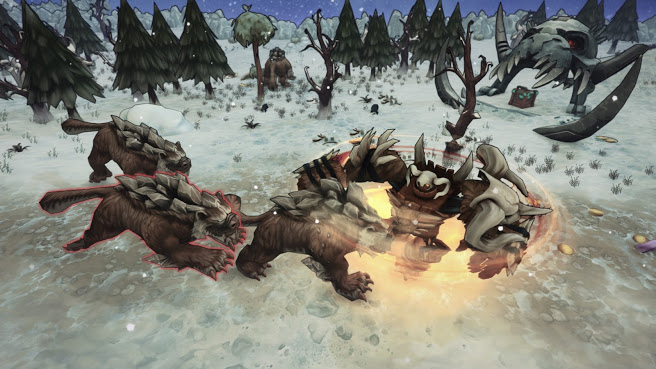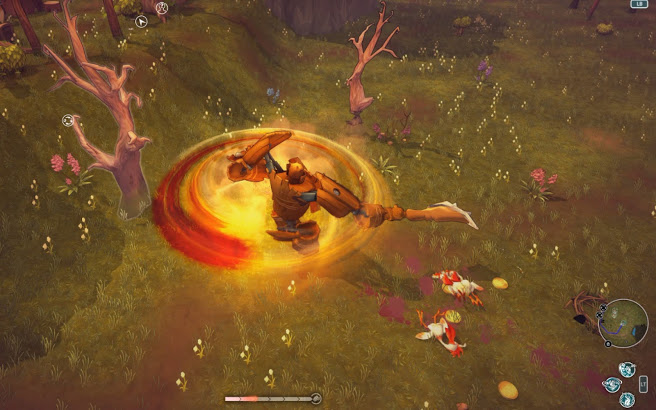Sweeping assumptions are dangerous, but here’s one I’m confident in. If you play games, then there’s a good chance you know a thing or two about giant robots. It’s not just games either; comic books, cinema, and animation populate a mere shortlist of mediums that have experienced a giant robot phase of some kind, and likely will again.
Whalebox Studios’ Goliath may be a bit more The Iron Giant than Mobile Suit Gundam in its visual styling, but my PAX East demo from earlier today set the record straight on just what the Hulk-smashing Goliath has set its sights on. It’s a robot-building, procedurally-generated Fallout-like, with crafting elements and a unique narrative spin. Obviously.
There’s a stigma clouding a sizeable subset of the “giant robot game” landscape (go ahead and refer to them as GRGs, I don’t mind), so I’ll address it first. How long will it take to acquire the damn giant robot? For this concerned and impatient player, Whalebox has good news—not more than five minutes.
After a bit of tutorial outlining controls and instruction on how to erect my goliath-making base of operations, I was piloting my very own wooden golem, complete with cute tree trunks for arms and an old-style hardwood bathtub for a body. It wasn’t yet a force to be reckoned with, but it was mine, and it didn’t take no seventy hours to get it, 'neither. Yes, that was a passive-aggressive allusion to Xenoblade Chronicles X.
The initial premise is one of the “waking in an unknown land” variety, and I was told by publisher Octopus Tree that Goliath’s open world consists of several smaller, procedurally-generated areas. Computer-made locales can sometimes feel sterile when it comes to player engagement, yet just moments after plodding outside of my main base’s safe-zone I spotted collectible resources, objects of interest, and a charging wooly mammoth just about all at once. My wooden buddy didn’t stand much of a chance, but I snagged a few logs and twigs and built him again. No harm done, and I was back in the fold quickly.
The strategic crux of the game becomes clear once you begin churning out more powerful goliaths, and this can be done by swapping better parts onto your current machine or creating new ones from scratch and garaging them. Before long I’d acquired some simple coals by burning sticks for warmth (you can set up camp in the wild at any time), and with five of them in hand I converted most of my goliath’s main body parts to make them flame-infused. Not only did this increase the damage output of its swings and special moves, but it rendered the already-waterproof wooden machine immune to fire as well. Time to go torch that miscreant wooly mammoth from earlier.
The interchangeable pieces of a goliath are its head, torso, arms, and legs, all of which have the resulting improvements or setbacks you’d expect depending on which is swapped out. Perhaps more interesting than micro customizations, though, are the overarching traits that make each giant robot style (you know, GRS) unique. Wooden machines have clear speed advantages, as well as a rolling dodge ability, while mechs of the metal or stone variety possess the ability to block or shield against foes. Wood can heal itself in the rain (because nature, I guess), while metal is rusted by it, and stone is unaffected. As you may have guessed by now, stone is the most powerful but the slowest, with metal taking middle ground as something of an in-between.
The game never explicitly informs you of these mechanics, leaving it to the player to learn and strategize while progressing. I mentioned how I enjoy organic discovery in games during my demo, and was met with a resounding “good, there’s more of it” in response.

There’s gameplay outside of bot-building, consisting mainly of quests and both character and environment-driven plot-development, but unfortunately my demo touched only very lightly on these parts of the game. Toward the end I was teleported to a later game-area where a boss supposedly lurked, and though I wasn’t able to track it down, I did trade blows with a massive Big Daddy-esque kitchen appliance, complete with a hook-studded lasso to prevent me from getting away. It was twice my goliath’s size, which is apparently small compared to a boss, so at the very least you can expect something large and in-charge for boss encounters. In this same vein, traveling on foot renders you invisible to massive foes, which I found to be a useful touch.
Goliath’s story is being handled by comicbook writer Zander Cannon, and from everything I’m hearing this is an exceptionally good thing. The game also supposedly contains interaction with other humans as well as a global conflict and Fallout-esque factions. If Mr. Cannon comes through with something thoroughly compelling to bolster Goliath’s “wake up and build robots” premise, I’ll be thrilled. Regardless, GRGs are never about narrative alone, and if part-swapping and bot-building are enough to flesh out the game’s self-ascribed 20-hour length, that’s entirely fine by me.
There’s also a rumored fourth class of goliath outside of wood, metal, and stone, known as “crystal.” Through extensive research and exposure to GRGs, I’ve concluded this must be where Goliath becomes an SGRG (yes, that’s Super Giant Robot Game).
With Goliath's scheduled May 12th release date on Steam and just general tweaks and polish left on the development schedule, it won’t be terribly long before we find out.







